美国人不信风水不算命
Why are so many Chinese people atheist?
为什么中国人很多都是无神论者?
作者:Samuel Soohoo 塞缪尔·司徒勋
atheist: 无神论者 atheistic: 无神论的
I grew up in an agnostic/atheist home and became aware about the possibility of God’s existence since first grade (from visiting churches and Buddhist temples). But I was never interested in learning about religious teachings and theology, as I grew up in an environment which implied “respect [for] ghosts and spirits, but keep them at a distance” and disdained “religious fanaticism above rational reasoning”.
我在一个无神论的环境中长大,从一年级(去了教堂和佛教寺庙的时候)我就意识到了神可能存在。但是我对宗教神学没有兴趣,也不想了解,因为我长大的环境在冥冥中告诉我,“对鬼神保持尊重,但是不要去触碰”,鄙视“宗教狂热高于理性的推理。”
Buddhist temples:佛教寺庙
fanaticism:n狂热 fanatic:n狂热的人,狂热分子 adj盲信的
fanatical: adj狂热的
The Xia and Shang Dynasties were religious, and Chinese characters originate from oracle bone script. Until the Zhou dynasty, diviners used an ox scapula or turtle shell to submit questions to Heaven (帝) or royal ancestors for predicting good weather, crop planting, the fortunes of royal family members and military strategy. Intense heat was applied to the bone/shell within a pit until it cracked (卜) from thermal pressure. A diviner would interpret the pattern of cracks and write his findings upon the piece.
夏朝和商朝信奉宗教,中国文化起源于甲骨文。从周朝起,占卜师就会用牛的肩胛骨或者乌龟的壳作为信物,在上面写一些问题去问神仙或者先帝,以此来预测天气的好坏、庄稼的收成、皇室成员和出征打仗军队的命运好坏。高温让骨头/壳破裂,占卜师就会根据裂痕把他们算出来的东西写在这片骨头或者龟壳上。
oracle bone script:甲骨文
be applied to: 作用在。。。上
interpret:vi解释,说明;vt口译,翻译
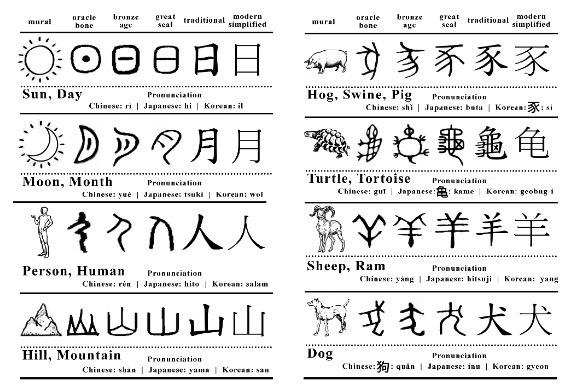
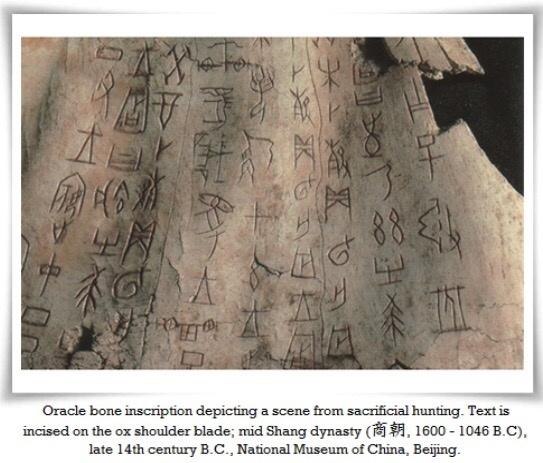
甲骨文碑文描写了打猎献祭的景象。这些文字被刻在牛的肩胛骨上,商朝中期(商朝,为公元前1600年-1046年),公元前十四世纪末,北京中国国家博物馆。
Although the Xia and Shang Dynasties are the co-founders of Chinese culture and civilization, some of these kings were priests who ruled through their cruelty and religion. Jie of_Xia claimed to be God of the Sun and was notorious for a lavish lifestyle of alcoholism, sex, slaves and eating habits (vegetables = Northwest, fish = East China Sea, seasonings/sauces = South and salt = North). After 31 years of tyranny, the effects of the Thera eruption spread to China, where summer ice/ frost and heavy rainfall toppled buildings and ruined crops. Tang of_Shang subsequently gathered enough support to overthrow Jie and establish a new dynasty at Anyang.
尽管夏朝和商朝都是中国文化文明的起源,有些王朝却是祭司通过暴政和宗教来掌控。夏朝末位皇帝桀称自己是天子,后来因为纵酒、纵欲、暴奴和及其奢侈腐朽的暴食(西北的菜,东海的鱼,南方的佐料和北方的盐)而臭名昭著。在十一年的暴政后,起义暴发产生的影响推翻了统治,彼时的夏朝已经满目疮痍了。后来汤把推翻桀的势力聚集起来,在安阳建立了一个新的朝代——商朝。
notorious:adj臭名昭著的
lavish: v浪费,滥用;adj浪费的,大方的
The Shang Dynasty is hailed for her system of writing, bone/pottery/jade objects, astronomical observations and agriculture. But within the capital city of Yinxu, archaeologists have also unearthed the skeletons of sacrificial victims captured in battle. War captives were kept as slaves for years (bone analysis reveals that they subsisted on millet, with no wheat/rice/meat before being killed), while other remains were those of servants or family members who were buried alive with elaborate items.
商朝因为书写成系统、骨头、陶瓷和翡翠物件、天文观察研究和农业出名。但是在都城殷墟,考古学家也发现了在战时俘虏的尸骨。战俘曾作为奴隶被关了数年(骨骼研究显示遇害前,他们靠小米充饥,没有小麦、大米和肉的摄入),然而其他人则是佣人或者亲属带着陪葬品被活埋。
be hailed for: 因。。。而出名
unearth:v出土
war captive:战俘
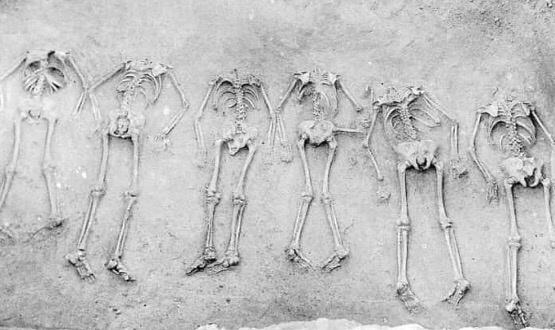
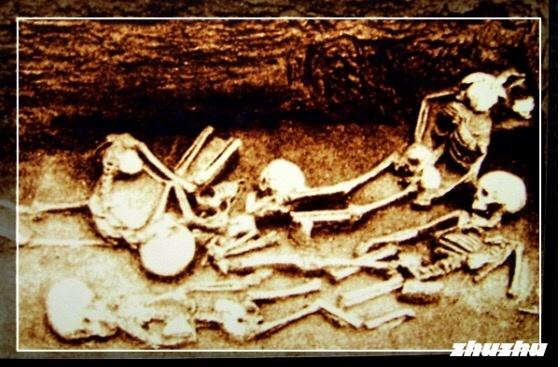
The top image reveals 6 decapitated POWs, while the bottom shows 5 young girls.
上面的图片是六个被斩首的战俘,下图则是五个年轻的女孩。
Duke Xian of Qin eventually banned slavery and human sacrifices during the Zhou dynasty, because people began to realize that “they and their neighbors were just simple human beings, they began to learn from neighbors and mix with others. They began caring more about humanity and worshiped heroes instead of [infallible and] omnipotent gods” (User-11544584179186227097). Human sacrifice had been utilized to inspire fear and awe among subjects, but became reviled as a symbol of despotic rulers, as a translation (Zhang Quan) of an answer from Zhihu explains:
晋献公秦最终在商朝废除了奴隶制和陪葬,因为人们已经开始意识到,“他们和身边的人都只不过是简单的人罢了,并开始从身边学习、应用。而且,也开始更多地关注人性和英雄,而不是绝对正确的、万能的神。(用户-11544584179186227097)” 活人献祭激发人们的恐惧和敬畏,但后来都被贬为专制统治者的象征,就像一个从知乎上的答案翻译(张全)解释道:
ban: v废除
mix with: 与。。。混在一起
worship:v,n 崇拜,信仰
“Your teacher said that any people, any culture or society, must have some things that it holds sacred in order to thrive.
“你的老师说,任何文化和社会中的任何人为了繁衍生息,必须要有一些视为神圣的东西。
When the sky cracked, we melted the rocks to mend the gaps.
天有裂缝的时候,我们融石补天。
When the rivers flooded, we did not ask the prophets for a way to escape.
发洪水的时候,我们不会去找先知求一条逃跑的路。
Instead we dug drains and channels to manage the waters.
我们会挖沟渠、建运河来面对洪灾。
When the plagues came, we did not ask for miracles to save us.
瘟疫袭击的时候,我们不会去求奇迹发生拯救我们。
Instead we tested every herb and grass we could find on our own bodies until we found a cure.
我们会把能找到的草药都敷在身上,直到有一种管用。
When the East Sea drowned us in its swells, we filled it with earth.
东海要淹死我们的时候,我们就用泥巴补平。(精卫填海)
When the ten suns burned us with their rays, we shot all but one of them down.
十个太阳要把我们晒干的时候,我们就射下九个。(后羿射日)
Anyone who wants to be a passive participant to their own fate may choose so.
想成为主宰自己命运的人就会那么做。
Anyone who wants to prostrate as a sacrificial lamb may choose to do so.”
想牺牲的人也可以那么做。”
Chinese theology embraces the idea of God manifesting as the celestial poles and heaven (天). Because the Universe was created from a soup-like chaos of energy (气) and matter (混沌), the polar opposites of Yin and Yang characterize any thing and all life. Confucians argue that humanity should imitate heaven’s stability to create an ideal society, while Daoists believe the Way (道) is a fundamental source of energy + power which influences and predetermines everything/time/place from the universe’s beginnings and ending. Heaven is pantheistic/polytheistic and allows spirits (神) and ancestors (祖) to serve as mediators who generate phenomena that reveal or reproduce the order of heaven.
中国神话认为神是主宰天和地的,因为宇宙是从一片混沌中产生的,相反的两级——阴和阳——赋予一切事物特点。孔子认为人性应该趋于神的平和,以此构建大同社会。但是道家认为道作为一种能量和能源的基本来源,本身影响并预见了万事万物从宇宙之初到结局的发展过程。天庭是泛神论/多神论的,让各种神仙和先代作为中间者调和,他们产生揭示秩序的现象。
chaos: n混乱,混沌
pantheistic: adj泛神论的,泛神论者的
polytheistic:adj多神的,多神论者的
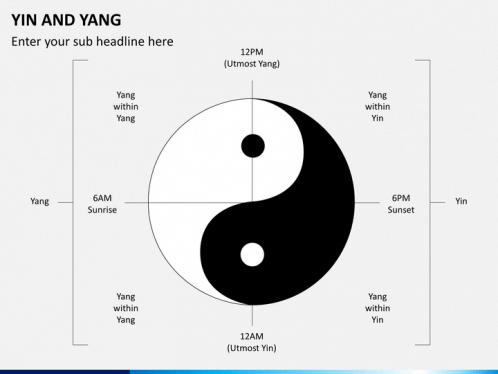
Yin is associated with darkness, shadows, and femininity, while Yang represents brightness, passion, and growth. -John Bellaimey
阴通常和黑暗、阴暗和柔联系在一起;阳代表光明、热情和刚。——乔治·贝莱梅
Therefore, Chinese religions are patriarchal and ancestral. Judaism believes in “the God of its fathers, but not its divine fathers” (Julia Ching) and Christianity is based upon the First Commandment: “thou shall have no other gods before me”. Unlike Abrahamic religions, which state that God created living beings out of nothing, Chinese thought is historically influenced by the Buddhist teachings about reincarnation, which holds ancestors as the root of current and future beings.
因此,中国的宗教是家族式的、一代传一代的。犹太教相信“神是列祖的神,而不是其神圣的父亲”(茱莉亚芹),而基督教是根据第一个教条“除我之外,再无他神。”不像伯拉罕教宣称神从无到有创造一切,中国人因为被佛教影响而相信来生转世,即是一种信念认为祖先既是现代的根基又归属于未来。
patriarchal:adj家长的,家长式的
Judaism: n犹太教
divine:n牧师,神学家;v占卜,预言;adj与神有关的,神圣的,非凡的
In China, beliefs are syncretic and allows religions to coexist and interpenetrate each other as a whole. Li enables people to ascertain the order of nature and establish stability + harmony between heaven, earth, and humanity. By forming “a culturally unitary single tradition [in which basic concepts and practices are related]” (Yao Xinzhong), collective memory enabled Chinese civilization to last 4000 years. Ancestor worship constructs and transmits group and individual identities to the next generation by mean of memory and rites/symbols/ideas/ objects, while descendants draw upon historical memory to formulate moral reasoning.
在中国,信仰是可以融合的,不同的宗教可以共存,并作为一个整体互相渗透。礼探知自然秩序,在天、地、人之间建造稳定和谐。通过形成“一种文化上联合的整体【也通常被认为是联系在一起】”(姚新勇),集体记忆使得中国文化延续四千年。通过记忆和习俗、象征、思想、物件的方式,先辈信仰在团体和个人身份中传递到下一代,虽然后人借鉴历史记忆进行道德推理。
interpenetrate: v贯穿,融合,交融
ascertain: v确信,查明
collective: adj集体的,共同的;n集体主义,集体名词
by means of:通过。。。的方式
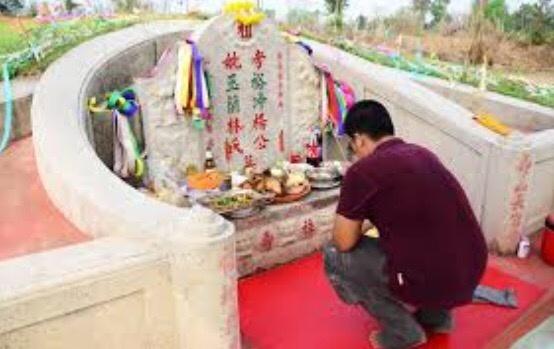
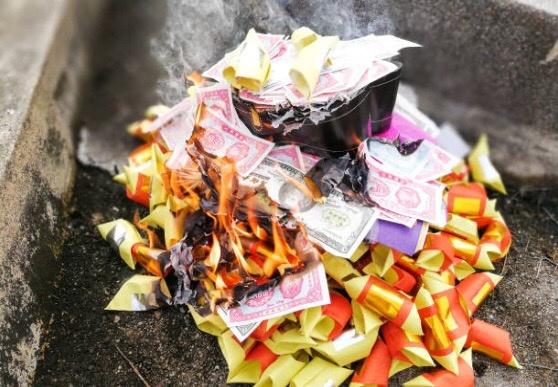
During Qingming, Chinese families visit and clean ancestral tombs, pray for favors from the deceased, and offer traditional food dishes, paper money, and incense.
清明节期间,中国家庭上门扫墓,向逝者许愿,通常会献祭传统的贡品、纸钱和香。
pray for:为。。祈祷
paper money: 纸钱
incense:n香
All images are from online!
所有图片都来源于网络